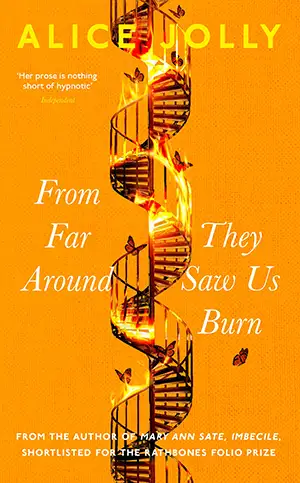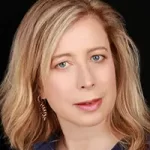Alice Jolly on the failure of “feel-good” books, taboo subjects, and writing about older women – as she discusses her first collection of short stories, From Far Around They Saw Us Burn
Interview by Sophie Haydock
I don’t think there is much point in any writing which isn’t taking risks.

The stories in From Far Around They Saw Us Burn touch on a range of complex themes, from grief, trauma and loss to identity and belonging. What draws you to these topics, and how do you approach writing about them in a way that is both authentic and respectful?
People often say that my books and stories are quite dark and sad. I am not really sure that is true. I think that, overall, we are inclined to seriously understate how much sadness there is in the world. Particularly at the moment, things are really tough for so many people. I want to write about human lives in an honest way because I suspect that, overall, many people do not find that ‘feel-good’ books make them feel good. CS Lewis said, ‘We read to feel that we are not alone.’ That is so important. I also firmly believe in what Thomas Hardy tells us. ‘If way to the better there be, it exacts a full look at the Worst.’
Your work has been described as “unflinching” and “brave”. Do you see yourself as a writer who takes risks, and how do you approach writing about difficult or taboo subjects?
I don’t think there is much point in any writing which isn’t taking risks. I have probably become more of a risk taker as my career has developed. That is partly a factor of age. You reach a point when you realise that, if you have a big book to write, you better write it now. My experience of ‘taboo’ subjects tells me that a taboo is not something which people don’t want to talk about. It is something which everyone wants to talk about but they do not know how to start. I do hope I have started some necessary but difficult conversations. However, I would stress that all this has its costs and they are high.
Your writing often features strong female protagonists in ways that feel authentic and respectful. What kind of feedback have you received from readers about these characters?
I often joke that my friend’s mothers are my biggest fans. I think that is because I often write about older women. Often those women are not strong or powerful in any obvious way. But they do often have an inner resilience. Of course, women have been undervalued for centuries and, although progress towards equality for women has been made, we are actually now seeing some of that progress being reversed. It is heartbreaking. But women are often brilliant at compromising, negotiating, building something which they value, even in the worst of circumstances. Overall, I often feel that the language itself often needs to be re-made. What do we really mean by strength or power? Women often don’t just want to ape the achievements of men. They want a world which is more able to recognise and celebrate some of the quieter forms of action and power.
You’ve won numerous awards, including the O Henry Prize for the title story in From Far Around They Saw Us Burn. What does it mean to you to be recognised for your writing in this way, and how does it impact your work going forward?
The whole question of awards is interesting. One important point is that all awards are different. They are funded and judged in different ways. They favour different kinds of work. Some prizes are a labour of love, some have a more commercial motivation. Of course, if you receive any award then that is brilliant and the prizes I have won have increased my confidence. They have made it possible for me to keep writing. But I was told quite early on that there are only two or three prizes which will bring ‘sales uplift’. What a ghastly phrase that is. However, I put that information here as it is useful for people to know. Many writers think that their life will be transformed if they get onto a prize shortlist but sadly it is not quite as simple as that. The effect may be less than expected. There is a big tendency to mock literary prizes but, for me, they are often a way of saying – we can talk about the overall value of a book and its quality rather than just look at sales figures. That’s so important.
You’re also a creative writing teacher. How does your experience teaching writing influence your own writing process and approach to the craft?
At present, teaching in the Universities is a nightmare because of the strikes (which I do support). Every time I teach I think – I am not doing this again. The admin, the travel, the hassle, etc. Then the moment of the actual teaching comes and it is brilliant. The students are invariably great and that makes it all worth it. Also, it is so incredibly precious to be able to set time aside to actually look at work on a line-by-line basis. For a couple of hours, we can shut the door on the literary bureaucracy and remember what the whole thing is actually about. I so often find myself inspired and encouraged by students. I hope I do the same for them.
You’ve mentioned in previous interviews that you often start writing without knowing where a story will go or how it will end. How do you approach the writing process, and do you have any advice for writers who struggle with writer’s block or uncertainty about their work?
I do try to know as much as I can before I start writing. It is hard enough if you know where you are going and so, inevitably, much worse if you do not. I do redraft many, many times but I seldom get totally stuck. However, for those who do get stuck I think the key thing is to go back to freewriting. Just sit down and write anything that comes to mind. Do that for a while. Don’t stop and don’t judge. It is always the judgement which is the killer.
Are there any particular writers or stories that inspired you while you were working on this collection?
I read widely and I find that I tend to take something away from nearly every book (even the ones I don’t particularly like). I am inspired by some of the classic short story writers – people like VS Pritchett, Saki etc. I also very much admire David Constantine. Overall, however, I am probably more inspired by novelists. I love Hubert Selby Jnr and William H Gass. Perhaps my all-time favourite writers are Shirley Hazzard and James Salter. In terms of short stories, it is worth mentioning that Scratch Books have bought out two books called Reverse Engineering (I and 2). These books consist of a short story and then an interview with the writer about the short story. It can be quite difficult to find good analyses of short stories so these books are brilliant and much needed.
What advice do you have for aspiring writers who are trying to find their voice and develop their craft?
To a large extent, writing is just about stamina. You have to keep turning up at the page day after day. Of course, it can be incredibly difficult to find the time. I think that is becoming a bigger and bigger problem. I see how my students are under so much pressure. In the current situation, just keeping yourself alive can be pretty hard work. But I do think it is a really good idea to write every day. Even if it is just for ten minutes. Somehow doing that keeps the work alive in your mind. There is a lot of writing which doesn’t happen on the page. But you do need to put something down on paper regularly in order to keep that imaginative world alive in your head. A notebook or journal is also a very good idea. That means you can write at any time. Even if you just do ten minutes a day it can be surprising how quickly the work grows.
Ultimately, what do you hope readers will take away from the stories in the collection?
I want and expect that every reader will take away something different from what I write. That is the joy of reading, isn’t it? I am not the only person making the book. The reader makes the book as well because they bring their own life experiences, thoughts and ideas to it. Also, they make their own imaginative world out of what I am writing. When I was still quite young a lady came up to me after a reading and said – I love the way that you write about landscape because it made me think of my home in Canada. Believe me, the book she was referring to has nothing at all to do with Canada. But I wasn’t puzzled by her comment, I thought it was brilliant. I saw how she had used her imagination to re-make the book into something which had meaning for her.
Finally, what’s next for you as a writer, and are you currently working on any new projects that you can share with readers?
I am just finishing a new novel. It is called Dr Asperger’s Dilemma. It is about the man whose name was given to Asperger’s Syndrome. He was a committed and brilliant doctor who was a pioneer of autism research. But he was living in Vienna in the 1930s and ’40s and he became a major Nazi collaborator. I anticipate difficulties in getting the book published. Sometimes I look at it and wonder if it is the equivalent of literary suicide. But I am also sure it is a good and necessary book. What I am really doing is asking questions about collaboration. Those questions are highly relevant to our own age, but they make us very uncomfortable. What I really want to do now is to get the book off my hands and move on because there is something else I want to write.

Alice Jolly is the author of five novels, including 2018’s acclaimed Mary Ann Sate, Imbecile, which was long-listed for the RSL Ondaatje Prize and shortlisted for the Rathbones Folio Prize. Her memoir, Dead Babies and Seaside Towns won the PEN Ackerley Prize in 2016. From Far Around They Saw Us Burn is her first collection of short stories. From Far Around They Saw Us Burn by Alice Jolly is out now: Unbound (£18.99)
Associate director Sophie Haydock’s debut novel, The Flames, won the Impress Prize for New Writers. It was published by Doubleday, an imprint of Penguin Random House, in March 2022 and will be translated into several languages. It is about the four women who posed for the artist Egon Schiele in Vienna more than 100 years ago – and the Instagram account she set up (@egonschieleswomen) now has over 110,000 followers. Sophie is a freelance journalist (Sunday Times, Financial Times, Guardian) and editor. Passionate about short stories, she judges literary prizes and competitions. She is currently writing her second novel.


